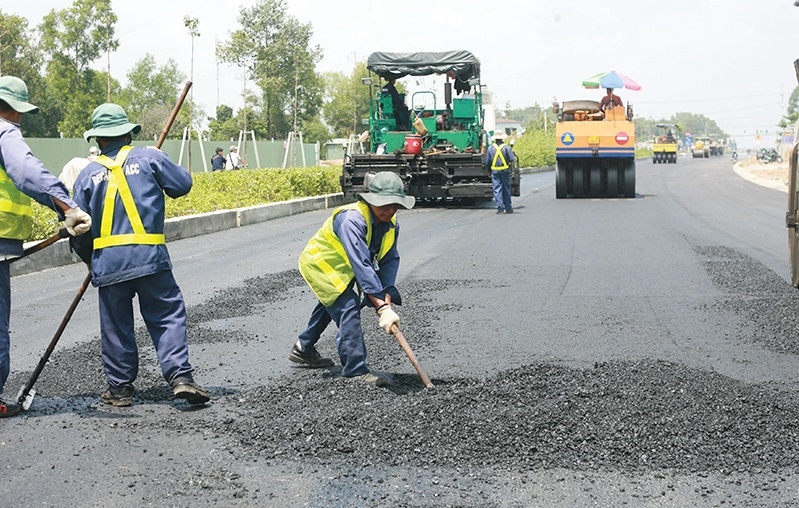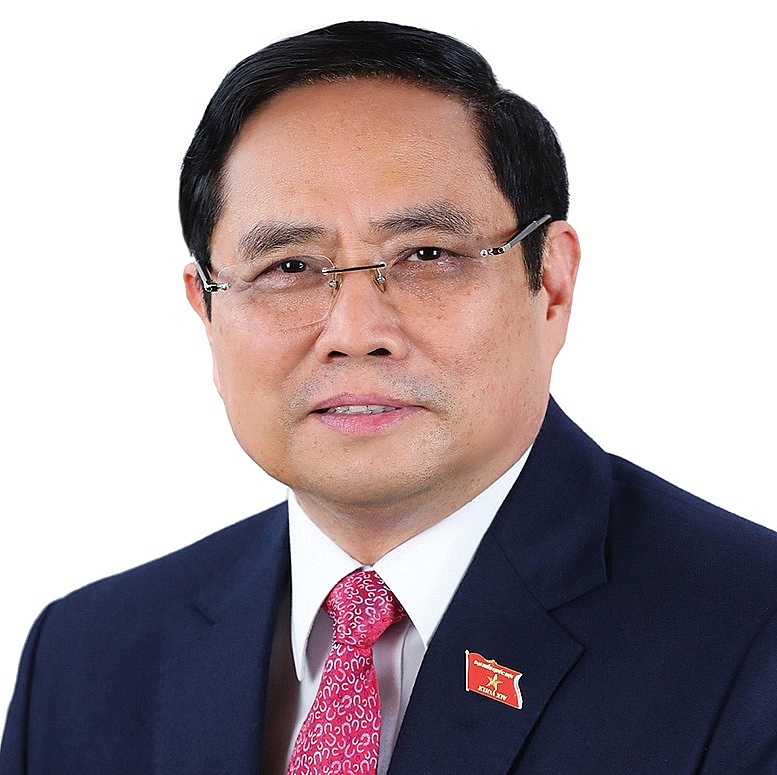Public investment to spur faster growth
 |
| Public investment to spur faster growth |
The Ministry of Planning and Investment (MPI) on April 20 sent a document to ministries, agencies, and localities nationwide asking them to report barriers in their activities involving disbursement of state budget capital allocated to them for 2021.
They are also requested to report the results of public investment disbursement, including sums disbursed and that having failed to be realised, as well as proposed solutions for boosting such disbursement.
“The solutions include two groups, with the first on policies about investment procedures and plan, site clearance, and construction, and the second on project implementation,” said MPI Deputy Minister Tran Quoc Phuong, who signed the document. “Boosting public investment will help grow the economy, attract more private investment, and create more employment for local workers.”
The MPI will collect all ideas and solutions and then make official proposals to the government in public investment disbursement for this year and beyond, which must ensure goals, high quality, and effectiveness in the use of this type of capital.
The ministry has also required ministries, agencies, and localities to report to it their 2021-2025 mid-term public investment plans, in terms of total needed capital, how to allocate the capital, proposed projects, and estimated results for the period.
The MPI is the first ministry to implement Prime Minister Pham Minh Chinh’s order to boost public investment disbursement as one of the key solutions to stimulate national economic growth. The order was made on April 15 during PM Chinh’s first government cabinet meeting after the government’s new personnel group made a debut at the recent 11th session of the 14th National Assembly.
“The government orders heads of ministries, agencies, and localities to be directly and comprehensively responsible for the implementation and disbursement of public investment as planned,” he said.
| Pham Minh Chinh - Prime Minister
COVID-19 is raging globally in an extremely complicated manner, with a continued rise in the number of victims. Within Vietnam, there is a big risk of a resurging pandemic. So it would be a very difficult job for us to implement a dual task of economic development and fighting against the pandemic at the same time. All ministries, sectors, and localities, organisations, units, and individuals are requested to take great caution against the pandemic, for the sake of the community’s health. They have to strictly implement anti-pandemic solutions. Leaders of ministries, sectors, agencies, and units of localities have to frequently update the pandemic situation in the country and worldwide. They must not be passive in all scenarios of possible outbreaks. All responsibilities of relevant people must be clarified. All individuals have to stringently implement all solutions against COVID-19, and especially have to wear facemasks. All organisations and units have to frequently examine and update results of the implementation of tasks against the pandemic. Competent authorities have to strictly punish all violations and violators under the law. Crowded gatherings and events are limited. The Ministry of Health must be more active in boosting international cooperation in access to COVID-19 vaccine sources and quick test technologies, and facilitate the domestic production of vaccines. |
Boosted disbursement
According to the Ministry of Finance (MoF), in the first quarter of 2021, total disbursement of state-funded projects, mostly infrastructure ones, remains low, at VND60.75 trillion ($2.64 billion), reaching 11.95 per cent of the initial plan and 13.17 per cent of the plan assigned by the prime minister. In which, foreign-funded capital disbursement hit only 0.66 per cent.
Many localities achieved high disbursement rates, including Thai Binh (43.24 per cent), Bac Ninh (30.2 per cent), Hung Yen (28.67 per cent), Thanh Hoa (27.79 per cent), and Ha Nam (27.63 per cent), and the Ministry of Public Security (31.62 per cent). Up to 31 ministries, central agencies, and localities including Hanoi have yet to boost disbursement.
A few weeks ago, showing up its strong efforts to realise this type of capital, Hanoi’s authorities decided on using its own budget to invest over VND1.75 trillion ($76.3 million) into five infrastructure projects vital to local residents of its outskirts. For example, one of the projects worth VND463 billion ($20 million) is constructing a 1.1km road in Xuan Dinh area, which is home to hundreds of thousands of residents including many foreign nationals.
This road will also be connected with a road leading to Samsung’s $220 million research and development centre currently under construction and to some overseas-backed property projects under construction including British-backed Refico Real Estate Group’s Kosmo Tay Ho.
It is calculated that over the next five years, Hanoi will need about VND482.8 trillion ($21 billion) worth of public investment for its infrastructure projects. A resolution for the 2021-2025 public investment plan has also been adopted by the city’s authorities.
According to a report adopted at the recent 13th National Party Congress, over the next five years, public investment will be effectively restructured and reduced in the total development capital structure.
“Public investment will be focused on key sectors of the economy, key works and projects which have spillover effects and can create socioecomomic development momentum, and create breakthroughs in attracting capital from domestic and foreign private sources under the form of public-private partnerships (PPPs),” the report stated.
“All loans must be strictly controlled in order to invest into socioeconomic infrastructure. Inspection in all public investment activities will continue being launched so as to prevent corruption and wastefulness.”
Each percentage of public investment rise will create 0.06 per cent economic growth in Vietnam.
In late 2020, the National Assembly passed a plan for boosting public investment for 2021. Accordingly, total capital from state coffers for this year will be VND477.3 trillion ($20.75 billion).
This sum will be earmarked for many projects. For example, nearly $700 million will be used for national target programmes, just over $650 million for the project on constructing the North-South Expressway; $202 million for land compensation and resettlement for Long Thanh International Airport; over $121 million for developing coastal roads; and nearly $205 million for supporting localities in implementing some key new infrastructure ventures.
According to the MPI, in 2021, these new investment capital sums, in addition to capital attracted from private investors, will help to complete the construction of the eastern cluster of the North-South Expressway project, the national coastal road line, connection road lines, airports, and seaports.
The MoF reported that in 2020, nearly $17 billion, equivalent to 82.8 per cent of the plan allocated, was disbursed, while the figure as of end-November was only $14.3 billion, equalling 70.1 per cent. This is the highest ratio of disbursement in 2016-2020 – with 80.3 per cent in 2016, 73.3 per cent in 2017, 66.87 per cent in 2018, and 67.46 per cent in 2019. Most of the capital has been invested in infrastructure works.
Vietnam’s economic growth hit 2.91 per cent last year, significantly fuelled by a boost in public investment, which has helped create massive employment and consumed a great deal of materials – increasing the performance of many key products in the economy such as electricity, steel, and cement, according to the General Statistics Office.
International calls
A number of high-profile international organisations are calling for Vietnam to boost public investment into socioeconomic development, with a focus on infrastructure works which will help Vietnam improve its economic competitiveness and attract more foreign investors – who are seeing weak infrastructure development as one of the biggest obstructions against their performance in the country.
The World Bank looked into the country’s fiscal stance, stating that the fiscal balance was in surplus for the first time since the onset of the pandemic. In the first quarter of 2021, the government collected $17.55 billion of revenues – up 3.2 per cent on-year, while total spending decreased by 0.4 per cent on-year to $14.9 billion, resulting in a fiscal surplus of over $2.6 billion, which is 29 per cent higher than a year ago.
Such a surplus will help Vietnam have more resources to increase public investment. “Implementation of public investment [in the first quarter] was on track with a disbursement rate of about 13 per cent, equivalent to the one achieved in the first quarter of 2020,” the World Bank said in a recent report. “After three years of fiscal consolidation, the authorities acted decisively and accelerated the disbursement of the public investment programme.”
Meanwhile, the Asian Development Bank (ADB), which has raised its forecast for Vietnam’s economic growth to 6.7 per cent in 2021 and 7 per cent in 2022, citing many key drivers including the strength of accelerated public investment, revived domestic consumption.
“There is room to further increase public investment spending as a share of GDP. Higher public investment spending can be achieved by utilising savings from rationalising current outlays, while improving efficiency and prioritisation,” said a recent ADB report on Vietnam. “Efforts should focus on closing Sustainable Development Goals gaps in roads, electricity and water sectors that have positive externalities and can crowd-in private sector investments. Investing in adaptive and digital infrastructure as currently being considered could boost growth and aid with the targeting of social assistance programmes and financial inclusion.”
MPI Deputy Minister Phuong told VIR that amid existing massive difficulties caused by COVID-19, accelerating public investment “will be among the best solutions to fuel the economy and enable it to hit the economic growth rate of about 6.5 per cent this year, and public investment will also have great impacts on the country’s attracting more private sectors.”
“It will take years to complete procedures for a project under the PPP format, so for the time being public investment is a feasible solution,” Phuong added.
What the stars mean:
★ Poor ★ ★ Promising ★★★ Good ★★★★ Very good ★★★★★ Exceptional
 Tag:
Tag:
Related Contents
Latest News
More News
- VNPAY and NAPAS deepen cooperation on digital payments (February 11, 2026 | 18:21)
- Vietnam financial markets on the rise amid tailwinds (February 11, 2026 | 11:41)
- New tax incentives to benefit startups and SMEs (February 09, 2026 | 17:27)
- VIFC launches aviation finance hub to tap regional market growth (February 06, 2026 | 13:27)
- Vietnam records solid FDI performance in January (February 05, 2026 | 17:11)
- Manufacturing growth remains solid in early 2026 (February 02, 2026 | 15:28)
- EU and Vietnam elevate relations to a comprehensive strategic partnership (January 29, 2026 | 15:22)
- Vietnam to lead trade growth in ASEAN (January 29, 2026 | 15:08)
- Japanese business outlook in Vietnam turns more optimistic (January 28, 2026 | 09:54)
- Foreign leaders extend congratulations to Party General Secretary To Lam (January 25, 2026 | 10:01)





















 Mobile Version
Mobile Version